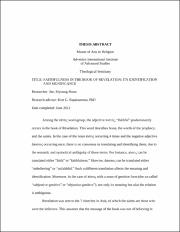| dc.description.abstract | Among the πίζηηο word-group, the adjective πηζηόο, “faithful” predominantly occurs in the book of Revelation. This word describes Jesus, the words of the prophecy, and the saints. In the case of the noun πίζηηο occurring 4 times and the negative adjective ἄπηζηνο occurring once, there is no consensus in translating and identifying them, due to the semantic and syntactical ambiguity of those terms. For instance, πίζηηο can be translated either “faith” or “faithfulness,” likewise, ἄπηζηνο can be translated either “unbelieving” or “unfaithful.” Such a different translation affects the meaning and identification. Moreover, in the case of πίζηηο with a noun of genitive form (the so-called “subjective-genitive” or “objective-genitive”), not only its meaning but also the relation is ambiguous.
Revelation was sent to the 7 churches in Asia, of which the saints are those who were the believers. This assumes that the message of the book was not of believing in
Jesus and the Gospel. It is notable that there is neither command nor counsel to believe (have faith in)—there is actually no verb πηζηεῦσ, “believe” in Revelation. Interestingly John is the predominant user of the verb πηζηεῦσ in the NT. In his Gospel, in which the verb occurs most frequently, he demonstrates that he wrote in order to lead people to believe in Jesus Christ and have life in His name (John 20:31). However, unlike the Gospel, it is more likely that Revelation emphasizes faithfulness rather than faith (act of believing). Eight occurrences of πηζηόο and 2 of 4 occurrences of πίζηηο clearly designate faithfulness. Also, the contexts support that the rest of the occurrences of πίζηηο and ἄπηζηνο also probably designate the faithfulness of the saints. Therefore, the πίζηηο word-group may be translated as “faithfulness” consistently in Revelation.
The passages of the πίζηηο word-group and the contexts indicate the identification of the faithfulness found in Revelation: divine origination and totality. Faithfulness is not simply a means of human to be saved, but a divine character shared by Jesus Christ, which should be called “a character of totality.” The “faithfulness-victory motif” confirms the significance of faithfulness in Revelation. Jesus, the Lamb, as the faithful One overcame by faithfulness at the risk of His life; likewise, the faithful saints of God will be victorious by their faithfulness. | en_US |

